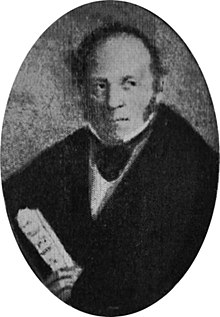August Mühling
Heinrich Leberecht August Mühling (born September 26, 1786 in Raguhn , † February 3, 1847 in Magdeburg ) was a German violinist and organist , conductor and composer .
Life
Mühling was the son of August Friedrich Christian Mühling and Johanne Amalie Meese . He grew up in Leipzig and learned the piano and violin at the Thomas School under the cantors Johann Adam Hiller and, from 1804, August Eberhard Müller . Already in his youth he appeared in public concerts (e.g. by the Leipzig University Music Director Johann Gottfriedschicht ). From 1804 to 1808 he was a violinist in the concert of the Leipzig Theater Orchestra ( Gewandhausorchester ); In 1805 he enrolled at the University of Leipzig . After a stay in Naumburg , he became music director in Nordhausen in 1809, succeeding Johann Ludwig Willing (1755–1805) . There he continued the subscription concerts started by Willing, worked as an organist at the Nikolaikirche and as a cantor at the grammar school and gave music lessons (including at the daughter's school). The young Gottfried Herrmann was one of his piano and organ students in Nordhausen .
When the shift, who had meanwhile worked as Thomaskantor, died in early 1823, Mühling applied unsuccessfully for his successor. Instead, he became the successor of Johann Andreas Seebach (1777–1823) organist at the Ulrichskirche in Magdeburg in the same year . There he also worked as an orchestra and concert director and headed the Seebach Singing Association , the Magdeburg Lodge and Harmony Concerts and the Magdeburg Liedertafel (all of which succeeded Seebach). He worked as a teacher of music at the cathedral seminar and finally became organist at Magdeburg Cathedral in 1843 .
He wrote compositions in almost all musical genres (with the exception of opera), of which his oratorios were particularly popular for the Magdeburg Music Festival, and published a musical almanac entitled Museum für Pianoforte, Musik und Gesang , the first year of which was in Halberstadt near Brüggemann in 1828 appeared. In 1842 he published a chorale book in which the most common chorale melodies, with regard to organ and piano playing as well as choral singing, are arranged in four parts, as well as provided with figures and simple interludes . His best-known work today is the canon "It takes little to be happy / and whoever is happy is a king".
Works (selection)
- Oratorio Abbadona (based on Klopstock's Messiah ; first performed on June 28, 1838)
- Oratorio Bonifacius, the German Apostle (first performed on October 25, 1840)
- Oratorio David (first performed October 16, 1845)
- Oratorio The Passion of Jesus (1847)
- Orchestra and chamber music, including two string quartets and a concerto for bassoon and orchestra
- Choir arias, motets, songs and four-part male chants
literature
- Ernst Ludwig Gerber: New historical-biographical lexicon of the Tonkünstler . 1813, col. 501
- Friedrich Häseler: History of the Magdeburg Liedertafel . 1869
- Hans-Rainer Jung: The Gewandhaus Orchestra. Its members and its history since 1743. With contributions on cultural and contemporary history by Claudius Böhm , Faber and Faber, Leipzig 2006, ISBN 3-936618-86-0 , p. 60.
- Hugo Riemann, Wilibald Gurlitt, Hans Heinrich Eggebrecht, Carl Dahlhaus: Riemann Music Lexicon . 1961. p. 277
- Peter Schmidt: In memoriam: August Mühling. For the 175th birthday on September 26th . Musica. 15 (1961), No. 9, p. 508.
Web links
- Works by and about August Mühling in the catalog of the German National Library
- Works by and about August Mühling in the German Digital Library
Individual evidence
- ↑ a b c d http://www.uni-magdeburg.de/mbl/Biografien/1720.htm
- ^ Adolf Bernhard Marx: Berlin general musical newspaper. Schlesingersche Buch-Musikhandlung, 1828, p. 392. Restricted preview in the Google book search
- ^ Carl Ferdinand Becker: The Tonkünstler of the nineteenth century. Kössling'sche Buchhandlung, 1849, p. 119. Restricted preview in the Google book search
| personal data | |
|---|---|
| SURNAME | Mühling, August |
| ALTERNATIVE NAMES | Mühling, Heinrich Leberecht August |
| BRIEF DESCRIPTION | German organist, conductor, composer and violinist |
| DATE OF BIRTH | September 26, 1786 |
| PLACE OF BIRTH | Raguhn near Dessau |
| DATE OF DEATH | February 3, 1847 |
| Place of death | Magdeburg |
